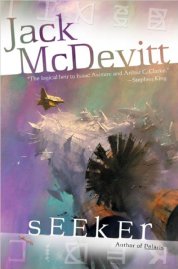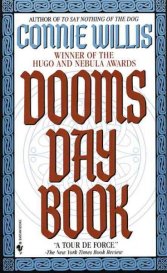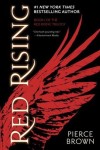Today’s guest post was written by Harold Kramer.
In this blog post, I’m going to discuss some of my favorite science fiction (sci-fi) books and authors. If you are interested in sci-fi, a good place to find some of the best science fiction are the Hugo and Nebula Awards. These annual awards constitute a list of outstanding sci-fi literature and drama. They also provide an international platform that showcases both established and new sci-fi authors in a broad range of genres and sub-genres.
Contemporary sci-fi has split into many sub-genres, such as dystopia (think Red Rising), alien invasion (like Ender’s Game), cyberpunk (like Neuromancer), and sci-fi/fantasy (Dune, for example). The common thread, that makes any literary or dramatic work science fiction, is that it deals with scientific topics such as life on other planets, space flight, time travel and life in the future. In fact, the library has recently merged its sci-fi collection into the fiction collection since it is has become difficult to distinguish “regular” fiction from science fiction.
For starters, here are two of my favorite authors:
Jack McDevitt is a master writer of classic sci fi. He has been compared to Arthur C. Clarke and Isaac Asimov, two legendary sci-fi authors. He has been nominated for the Nebula Award sixteen times. His two ongoing series of novels are the Ale x Benedict series and the Academy or “Hutch” (Priscilla Hutchins) series. Both series have definitive timelines, so you should really start at the beginning of each series. However, each novel can stand on its own. My favorite Alex Benedict novels are Coming Home and Seeker. Seeker won the 2006 Nebula Award for Best Novel. Two of my other favorites are his first novel, The Hercules Text a story about mankind’s reaction to receiving an intelligent signal from space, and Omega, a Priscilla Hutchins novel about mysterious energy clouds in space. It was nominated for the Nebula Award in 2004.
x Benedict series and the Academy or “Hutch” (Priscilla Hutchins) series. Both series have definitive timelines, so you should really start at the beginning of each series. However, each novel can stand on its own. My favorite Alex Benedict novels are Coming Home and Seeker. Seeker won the 2006 Nebula Award for Best Novel. Two of my other favorites are his first novel, The Hercules Text a story about mankind’s reaction to receiving an intelligent signal from space, and Omega, a Priscilla Hutchins novel about mysterious energy clouds in space. It was nominated for the Nebula Award in 2004.
Connie Willis is an American writer who has won more Hugo and Nebula awards than any other science fiction author ever. My favorites books by her are her trilogy of time  travel novels. These include Doomsday Book that is an account of time travel to the 14th Century by a female heroine who is a historian from Oxford University sometime in the late 21st Century. It is moving story of human frailty and courage during a time of great devastation. It’s as much historical fiction as it is sci-fi. Blackout and its sequel All Clear also feature female historians from Oxford University. These books are detailed, compelling novels about the courage of the British people during World War II. These novels won both the Hugo and Nebula Awards.
travel novels. These include Doomsday Book that is an account of time travel to the 14th Century by a female heroine who is a historian from Oxford University sometime in the late 21st Century. It is moving story of human frailty and courage during a time of great devastation. It’s as much historical fiction as it is sci-fi. Blackout and its sequel All Clear also feature female historians from Oxford University. These books are detailed, compelling novels about the courage of the British people during World War II. These novels won both the Hugo and Nebula Awards.
Let me know about some of your favorite sci-fi authors and novels and I will feature them in future blogs.




 You know you love sci-fi if…
You know you love sci-fi if…




